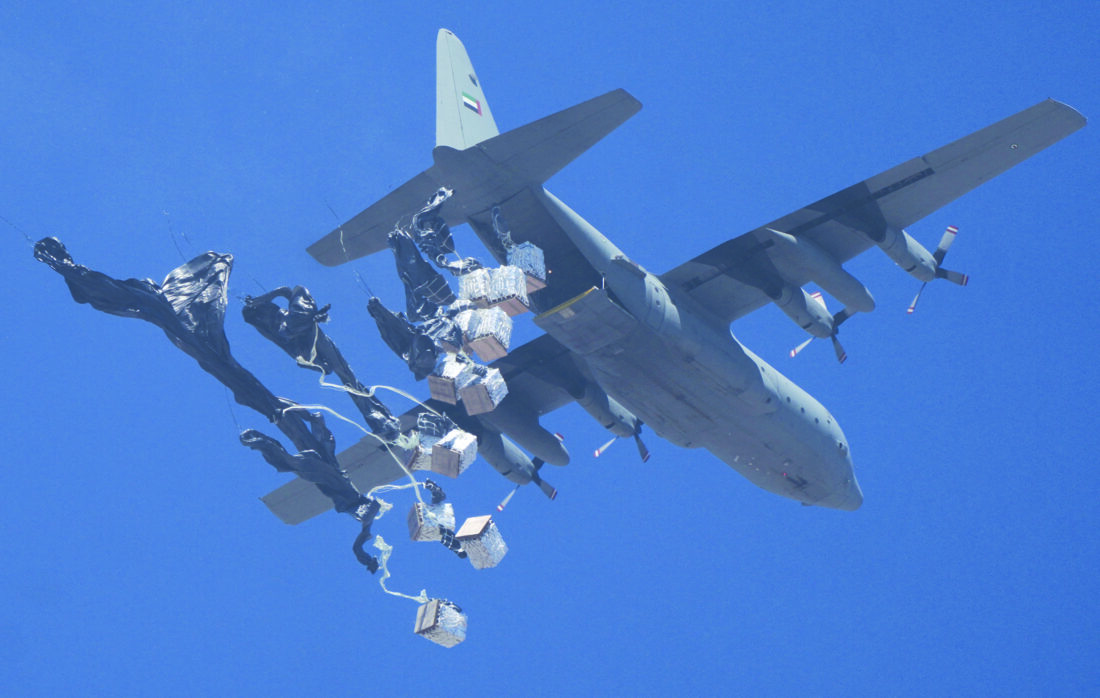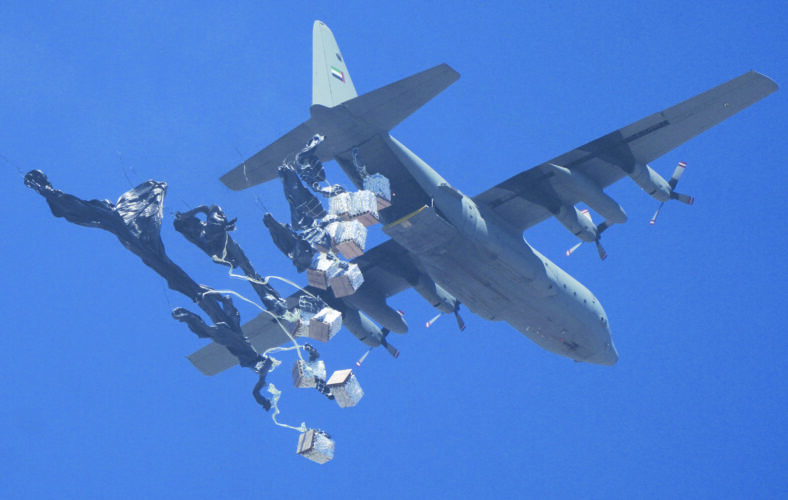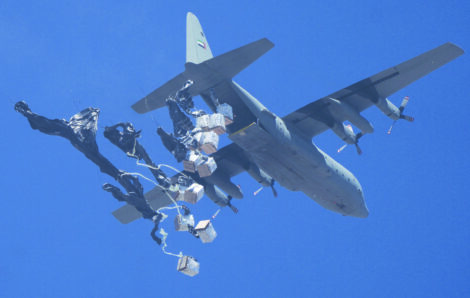Isreal begins daily pauses in Gaza fighting

Humanitarian aid is airdropped to Palestinians over Gaza City, Gaza Strip, on Sunday. (AP photo)
DEIR AL-BALAH, Gaza Strip — The Israeli military on Sunday began limited pauses in fighting in three populated areas of Gaza for 10 hours a day, part of measures including airdrops as concerns grow over surging hunger and as Israel faces criticism over its conduct in the 21-month war.
The military said the “tactical pause” in Gaza City, Deir al-Balah and Muwasi, all with large populations, would increase humanitarian aid entering the territory. The 10 a.m. to 8 p.m. pause is daily until further notice.
“Whichever path we choose, we will have to continue to allow the entry of minimal humanitarian supplies,” Israeli Prime Minister Benjamin Netanyahu said.
As the military had warned, combat operations continued otherwise. Health officials in Gaza said Israeli strikes killed at least 41 Palestinians from late Saturday into Sunday, including 26 seeking aid.
Images of emaciated children have fanned criticism of Israel, including by allies, who call for the war’s end. Israel has restricted aid to Gaza’s population of over 2 million because it says Hamas siphons it off to bolster its rule, without providing evidence. Much of the population, squeezed into ever-smaller patches of land, now relies on aid.
“I came to get flour for my children because they have not tasted flour for more than a week, and thank God, God provided me with a kilo of rice with difficulty,” said Sabreen Hassona, as other Palestinians trudged along a dusty road carrying sacks of food.
Aid delays deadly
Israel’s military said 28 aid packages containing food were airdropped Sunday, and said it would put in place secure routes for aid delivery. It said the steps were made in coordination with the United Nations and other humanitarian groups.
The U.N. World Food Program said it had enough food in, or on its way, to feed all of Gaza for nearly three months. It has said a third of Gaza’s population were not eating for days and nearly half a million people were enduring famine-like conditions.
Antoine Renard, WFP’s country director for the occupied Palestinian territories, said around 80 WFP trucks entered Gaza, while more than another 130 trucks arrived via Jordan, Ashdod and Egypt and other aid was moving through the Kerem Shalom and Zikim crossings.
He stressed it was not enough to counter the “current starvation.”
Ceasefire talks up in air
Ceasefire efforts appeared to be in doubt. Israel and the U.S. recalled negotiating teams from Qatar on Thursday, blaming Hamas, and Israel said it was considering “alternative options” to talks.
Israel says it is prepared to end the war if Hamas surrenders, disarms and goes into exile, something the group has refused.
Senior Hamas official Mahmoud Merdawi said Israel’s change of approach on the humanitarian crisis amounted to an acknowledgement of Palestinians starving in Gaza, and asserted that it was meant to improve Israel’s international standing and not save lives.
Distribution of aid iffy
After ending the latest ceasefire in March, Israel cut off the entry of food, medicine, fuel and other supplies to Gaza for 2 ½ months, saying it aimed to pressure Hamas to release hostages. Fifty of them remain in Gaza, over half of them believed to be dead.
Under international pressure, Israel slightly eased the blockade in May. Since then, it has allowed in around 4,500 trucks for the U.N. and others to distribute. The average of 69 trucks a day is far below the 500 to 600 trucks the U.N. says are needed. The U.N. says it has been unable to distribute much aid because hungry crowds and gangs take most of it from trucks.
As a way to divert aid delivery from U.N. control, Israel has backed the U.S.-registered Gaza Humanitarian Foundation, which in May opened four centers distributing boxes of food. More than 1,000 Palestinians have been killed by Israeli forces since May while trying to get food, mostly near those sites, the U.N. human rights office says.
___
Goldenberg reported from Tel Aviv, Israel, and Magdy from Cairo. Associated Press writer Seung Min Kim in Turnberry, Scotland, contributed.
___
Follow AP’s war coverage at https://apnews.com/hub/israel-hamas-war





